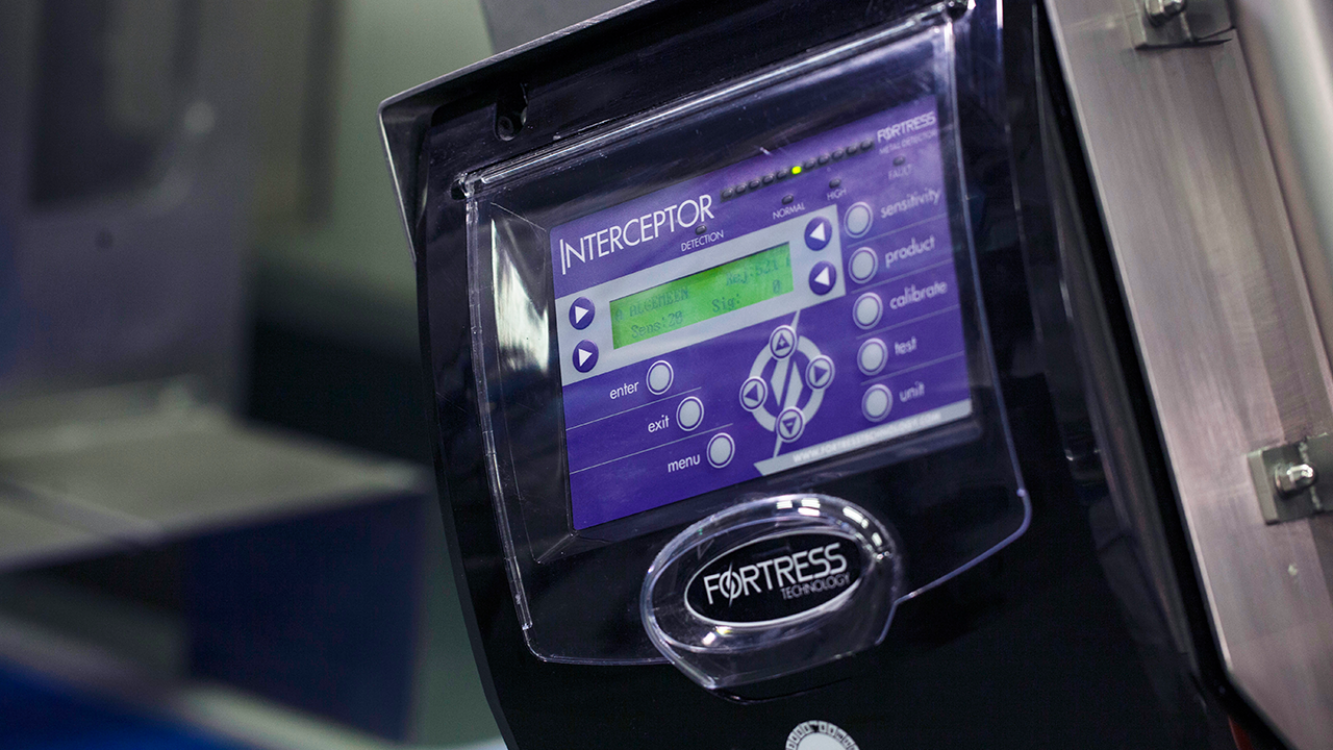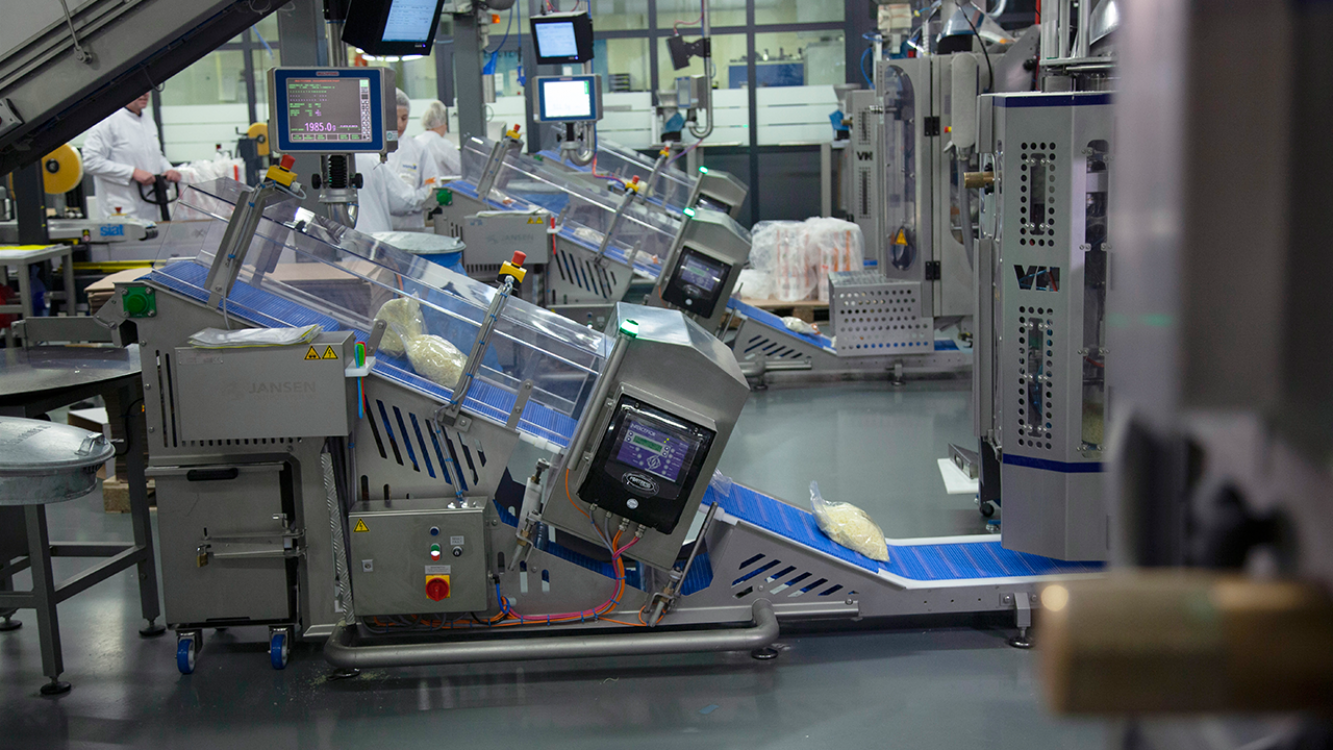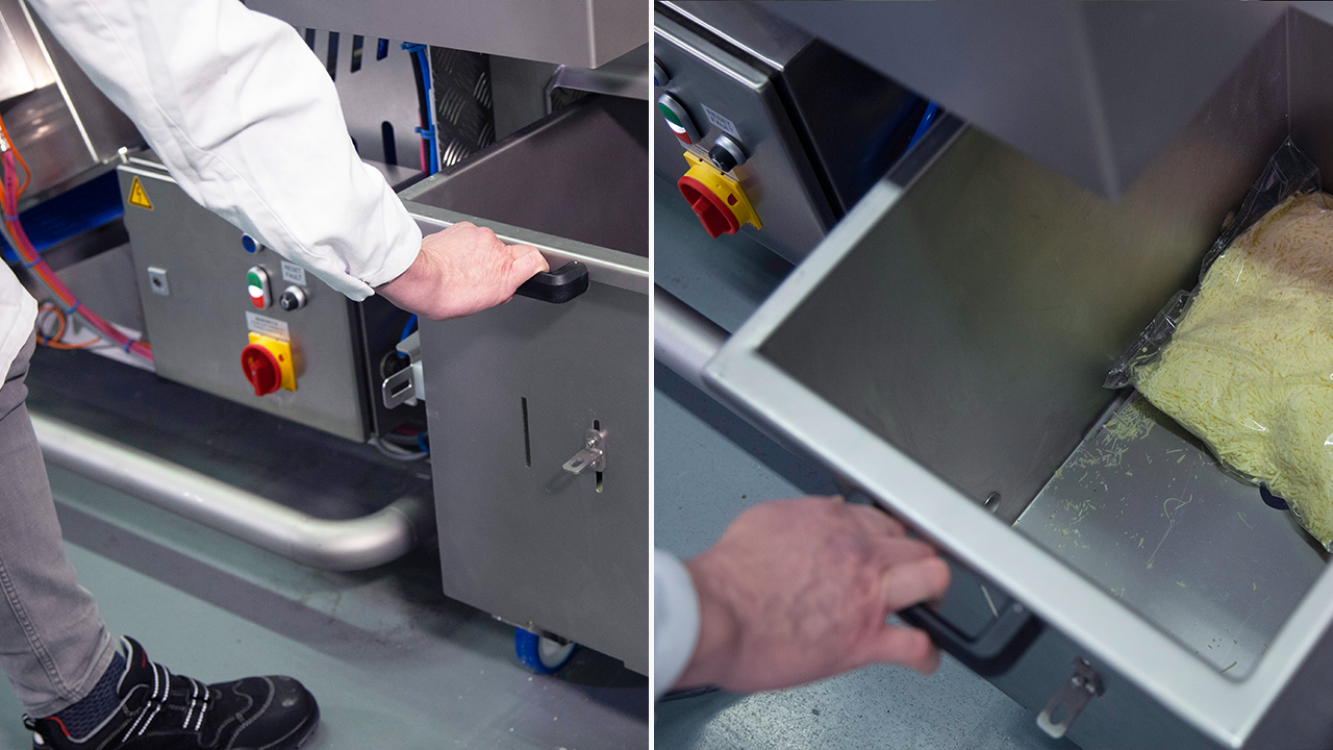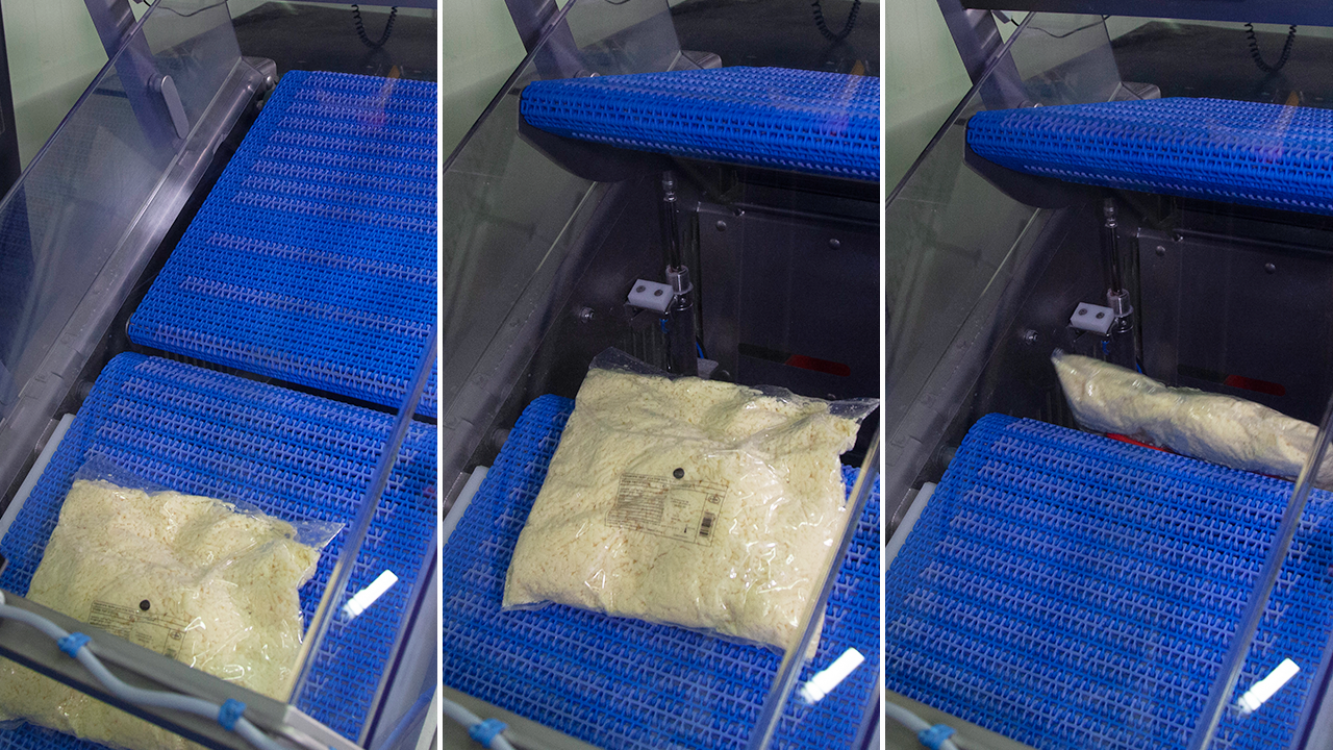With a high rate of automation in its two Dutch cheese factories in Bodegraven and Oudewater (close to Gouda), Vepo Cheese prides itself on production efficiency. Slicing, grating, cubing, portioning and packaging millions of kilos of hard cheese a year, the third generation family business recently upgraded all of its production lines with a new incline layout comprising seven highly sensitive Interceptor Metal Detectors from Fortress Technology.
Having replaced its obsolete metal detectors with a used Fortress unit three years ago, Vepo was already won over by the Fortress difference, especially the company’s ‘Always Upgradeable’ technology guarantee. For the Oudewater site, high performance, future proofing and an independent reject system on each line were important criteria. And Vepo knew instantly that they wanted Fortress metal detectors.
Interceptor - Increased Sensitivity
Approaching Dutch manufacturer Jansen Control Systems to design the compact incline inspection lines, each integrated with a vertical packaging machine, Vepo first examined the Stealth machine. But their attention was quickly diverted when Jansen’s Managing Director Gerard Schuurman explained the increased sensitivity of the Fortress Interceptor, and the advantages for cheese applications.
Recalling his conversation with the cheese giant, Gerard explained how these variations in density combined with the product effect could react in different ways in the magnetic field of a traditional food metal detector. “Not addressing product effect can lead to higher product waste. Vepo was especially taken by the Interceptor’s increased sensitivity. Keen to introduce a more fail safe solution at their Oudewater facility, Vepo wanted a metal detection solution could increase the inspection pace in order to keep up with their growing production demands.”
Let us advise you.
Best solution for cheese
Explaining how the Interceptor machine works, Fortress European Managing Director Phil Brown comments: ”Inspecting wet products has for many years presented cheese makers with a number of challenges. Water like metal is conductive. And cheese is inherently a wet and conductive product that also contains mineral content like salt. Accurate detection also depends on the size, shape and orientation of metal particles.”
The Interceptor overrides the propensity of ‘wet’ product effects that can drown out the signal, in particular the signals caused by a stainless steel contaminant. Software algorithms make this possible by distinguishing between signals specific to the product and those that flag up anomalies. By singling out low-frequency signals, the Interceptor leaves the signal from stainless steel more readily identifiable in the higher-frequency range.
As a result, the system can pinpoint metal fragments with dimensions half those detectable with the previous generation of equipment, with greater reliability. The result of separating these two readings is any metal signal as a result of a genuine contamination isn’t swamped by product effect.
Maintaining automation efficiency
The ability to isolate rejected packs without interrupting the production flow was also important to Vepo. On previous inspection lines, Vepo didn’t have an automated reject system. If a contaminated pack was identified the belt would stop and an operative would have to intervene, remove the pack and restart the inspection process. For a busy fully automated processing and packing facility, this business interruption impacted productivity.
Reaffirming the importance of automation efficiency, Technical Operations Manager at Vepo, Hugo van Put comments: “From a quality assurance perspective, we are extremely satisfied. The automated reject system also gives us 100% control over production. There’s less human involvement, therefore less risk of human error. This also lowers the risk of a metal contaminant slipping through the safety net. From an efficiency perspective, continuous production is one of the main benefits.”
In order to keep the footprint small and for smooth, seamless production, Jansen developed an incline conveyor that could be fully integrated with the Interceptor metal detector, vertical packing system and periphery equipment. Logistically, it was quite an engineering challenge, explains Gerard.
Other features comprised an easy to clean conveyor belt and a robust easy-to-empty bin trolley that could stand up to the weight of heavy packs dropping in. All of the inspection lines were installed within a day, ensuring minimal loss of production time. “The Jansen team worked extremely closely with Vepo’s technical and quality managers to ensure the systems were thoroughly tested in order to guarantee a smooth installation,” notes Gerard.
Measuring just one metre at its widest point and just under three metres in length, Jansen also combined two conveyors into one which helped to reduce the number of controls. Within two hours of installation per line, the factory was running at full capacity accurately inspecting large quantities of grated cheese bags per shift. Noting that the implementation went really smoothly with clear training support, Hugo adds that false positive rejects have also fallen since the systems went in. “Fortress metal detectors are really sensitive. This helps us to feel confident that the risks of contaminants are minimal, with less chance of a food safety issue. Having the double readings within the Interceptor system also lowers the risk of false positive rejects, which saves on food waste.”
Total traceability
Another advantage of the newly fully integrated packing system is the processing transparency. Each metal detector features Contact Reporter software. Data from each packaging line is collated in a common collection system, enabling quality assurance and production leaders to monitor processing and inspection performance from a centralised location.
This automated record keeper developed by Fortress also helps the factory to keep track of and record logs for rejects, tests and process settings. Hugo comments: “Because we now have identical systems, the cost of maintenance and spare parts is lower.”
Phil Brown adds: “Jansen’s installation at Vepo is one of the best examples of inspection innovation and showcases how the latest technology can boost productivity and efficiency. Historically, metal detection systems had too many moving parts, and outcomes represented only incremental improvements in the trade-off between increased sensitivity and excessive false rejects. Only recently with the introduction of our Interceptor range have software algorithms that analyse signal data caught up with the potential value of both low and high frequency signals. Today metal detection can hold it own against x-ray inspection it in some of the toughest contamination challenges, while retaining a far more affordable capital cost and cost of ownership.”
Commenting on the installation, which went live in August 2019, Hugo concludes: “We are extremely satisfied with the innovation and level of industry knowledge and support that Jansen and Fortress deliver between them. As a third generation owner managed business we operate a modern and highly automated cheese production plant. Efficiency is integral to our production process. And the two teams understand exactly where we are coming from in terms of balancing product quality and enhancing operational productivity.”
Fortress metal detectors are really sensitive. This helps us to feel confident that the risks of contaminants are minimal, with less chance of a food safety issue. Having the double readings within the Interceptor system also lowers the risk of false positive rejects, which saves on food waste.
Interested? We would like to advise you!
Gerard Schuurman
With a high rate of automation in its two Dutch cheese factories in Bodegraven and Oudewater (close to Gouda), Vepo Cheese prides itself on production efficiency. Slicing, grating, cubing, portioning and packaging millions of kilos of hard cheese a year, the third generation family business recently upgraded all of its production lines with a new incline layout comprising seven highly sensitive Interceptor Metal Detectors from Fortress Technology.








